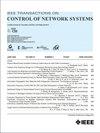Refined Algorithms for Adaptive Optimal Output Regulation and Adaptive Optimal Cooperative Output Regulation Problems
IF 4
3区 计算机科学
Q2 AUTOMATION & CONTROL SYSTEMS
引用次数: 0
Abstract
Given a linear unknown system with自适应最优输出调节和自适应最优合作输出调节问题的改进算法
给定一个具有$m$输入、$p$输出、$n$维状态向量和$q$维外系统的线性未知系统,该系统的自适应最优输出调节问题可归结为迭代求解一组线性方程,其中每个方程包含$\frac{n (n+1)}{2} + (m+q)n$未知变量。一个中等大小的问题可能需要形成并求解几百个这样的线性方程。因此,解决这样一个问题的计算成本可能是可怕的。在本文中,我们首先通过将这些线性方程解耦为两个较低维线性方程来改进现有算法。第一个包含$nq$未知变量,第二个包含$\frac{n (n+1)}{2} + mn$未知变量。因此,该改进算法将$\frac{n (n+1)}{2} + (m+q)n$未知变量的线性方程简化为$nq$未知变量的线性方程和$\frac{n (n+1)}{2} + mn$未知变量的线性方程。这不仅大大降低了问题的计算量,而且大大削弱了这些方程的可解性条件。此外,我们还将该改进算法应用于线性多智能体未知系统的自适应协同最优输出调节,显著降低了问题的计算量。
本文章由计算机程序翻译,如有差异,请以英文原文为准。
求助全文
约1分钟内获得全文
求助全文
来源期刊

IEEE Transactions on Control of Network Systems
Mathematics-Control and Optimization
CiteScore
7.80
自引率
7.10%
发文量
169
期刊介绍:
The IEEE Transactions on Control of Network Systems is committed to the timely publication of high-impact papers at the intersection of control systems and network science. In particular, the journal addresses research on the analysis, design and implementation of networked control systems, as well as control over networks. Relevant work includes the full spectrum from basic research on control systems to the design of engineering solutions for automatic control of, and over, networks. The topics covered by this journal include: Coordinated control and estimation over networks, Control and computation over sensor networks, Control under communication constraints, Control and performance analysis issues that arise in the dynamics of networks used in application areas such as communications, computers, transportation, manufacturing, Web ranking and aggregation, social networks, biology, power systems, economics, Synchronization of activities across a controlled network, Stability analysis of controlled networks, Analysis of networks as hybrid dynamical systems.
 求助内容:
求助内容: 应助结果提醒方式:
应助结果提醒方式:


